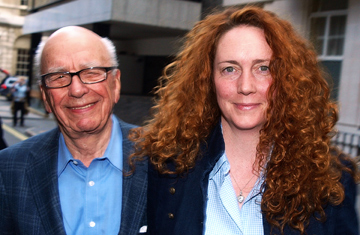
Rupert Murdoch, chairman of News Corp., and Rebekah Brooks, chief executive of News International, leave Murdoch's London residence shortly after his arrival in Britain on July 10, 2011
If Rupert Murdoch believed that sacrificing the News of the World, the most successful tabloid newspaper in Europe, might smooth his path toward the bigger prize of full ownership of satellite broadcaster BSkyB, then his legendary, hardheaded business brain must be telling him that long-cherished objective is now further away than ever.
Murdoch arrived in Britain on July 10 hoping to seize control of the phone-hacking scandal that engulfed the tabloid and is spreading like a forest fire. Instead he's walked into the sort of media scrum he is more used to starting through his newspapers. For once, he isn't pulling the strings.
Even as politicians and rival media groups renewed their demands for industry regulators to block his BSkyB bid, Murdoch launched an audacious move to outflank them by rewording the bid and suggesting it should be sent to the Competition Commission. That means any final decision is bound to be delayed for several months, by which time Murdoch hopes this current storm will be behind him.
That may prove to be a forlorn hope amid continuing signs that the scandal has some distance left to run. On Monday morning, July 11, his archrival in the tabloid market, the Mirror Group of newspapers, splashed claims that Murdoch's News of the World reporters had hacked the phones of 9/11 victims; the group also declared, somewhat hopefully perhaps, that his business empire was "crashing around him." Many of the nation's front pages carried a picture of a smiling Murdoch alongside his chief executive Rebekah Brooks — the editor during some of the alleged offenses who, with her boss's support, continues to defy gravity and hold on to her job.
Later that day, the BBC claimed that e-mails given to London's Metropolitan Police suggest that reporters from the closed paper had paid a royal-protection police officer for contact details for members of the royal family. It also emerged that former Labour Prime Minister Gordon Brown believed that another Murdoch title, the Sunday Times, had attempted to get hold of his private financial and property details. All of this threatens to spread the scandal beyond a single, now defunct newspaper.
It only gets worse. After a meeting with the family of 13-year-old murder victim Milly Dowler, whose phone was hacked while she was missing in 2002, Deputy Prime Minister Nick Clegg went further than Prime Minister David Cameron and called on Murdoch to "do the decent and sensible thing" and abandon his bid for BSkyB. Meanwhile, the minister in charge of the bid, Culture Secretary Jeremy Hunt, scurried to get the government off the political hook. He wrote to regulators, asking if their previous advice still stood that the bid should be allowed and claiming, "I'm trying to give the public confidence that I am doing this fairly and impartially." Or, as one opposition-party figure interpreted it, "I am trying to give voters confidence in the government."
No one doubts that Hunt wants the answer to be no, possibly on the grounds that Murdoch is no longer seen as a "fit and proper" person to own such a large chunk of the U.K. media. The government has found itself well behind the curve and public opinion on this affair, failing initially to demand the sacking of Brooks, a personal friend of Cameron, and then sticking to the letter of the law regarding the takeover bid.
Murdoch's tactical move to ensure that his bid is referred to the regulators may buy him some time, but it will do nothing to answer Labour's claims that the government has failed to get a grip on this affair. Worse for Cameron is the suggestion that the man he took into No. 10 as his communications chief, former News of the World editor Andy Coulson, had known about the hacking that was going on during his time at the newspaper. Coulson has denied those allegations. Labour leader Ed Miliband has sought to lay this directly at Cameron's feet by demanding to know why Cameron apparently ignored advice from a number of sources not to hire Coulson.
The question many are now asking is whether Murdoch is ready to make further sacrifices to boost his chances of winning BSkyB. Few in politics or the media back his unswerving support for Brooks, despite her insistence that she knew nothing of the hacking antics that happened on her watch between 2000 and 2003. The spotlight has even turned on Murdoch's son James, chairman of News International, who on July 7 admitted making out-of-court settlements in relation to phone-hacking claims, saying, "I now know that I did not have a complete picture when I did so. This was wrong and is a matter of serious regret."
There's a strong sense that the brouhaha is just beginning. Every day brings a fresh revelation, and none of them help persuade Murdoch's detractors that he is a fit and proper person to own an even bigger chunk of Britain's hugely competitive media landscape. For Murdoch, the sting must feel personal. For years, the U.K.'s politicians fell over themselves to cozy up to the powerful media magnate. Now Murdoch finds those same friends looking the other way.
